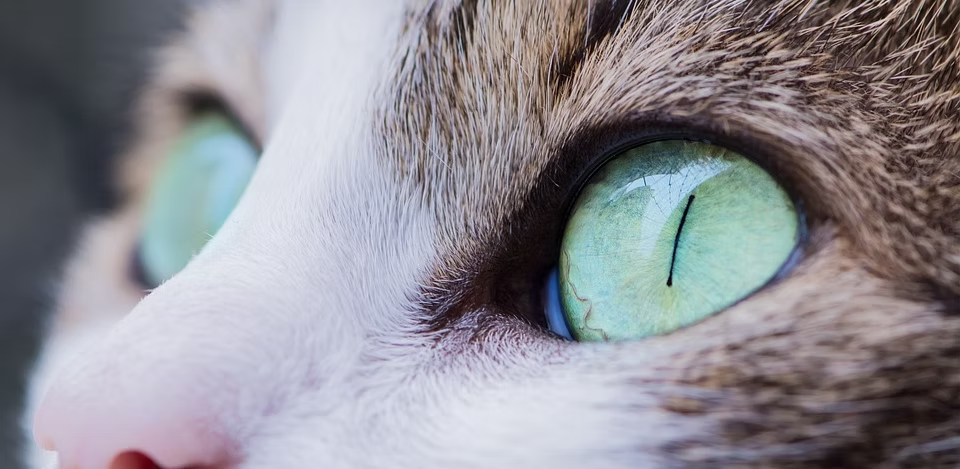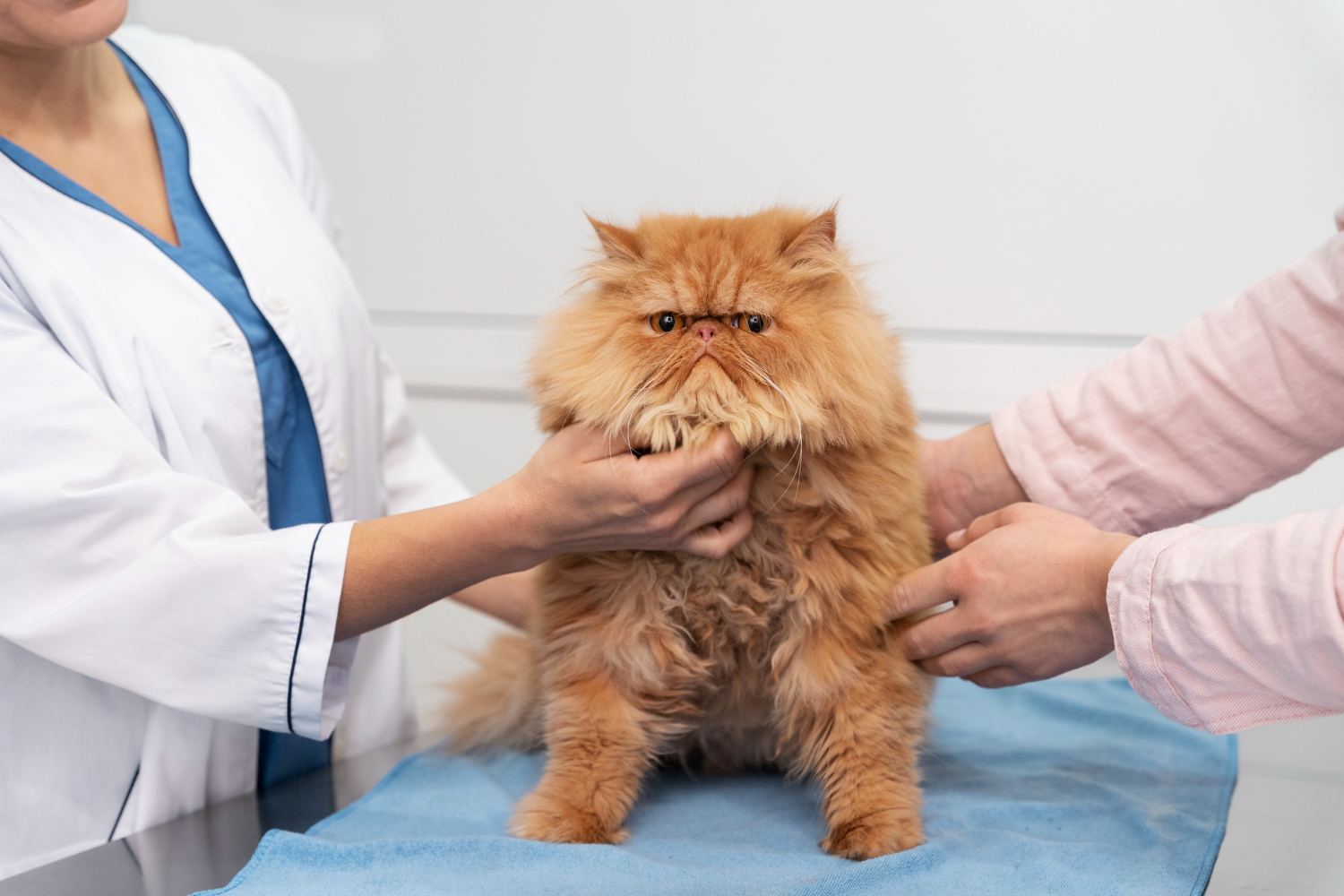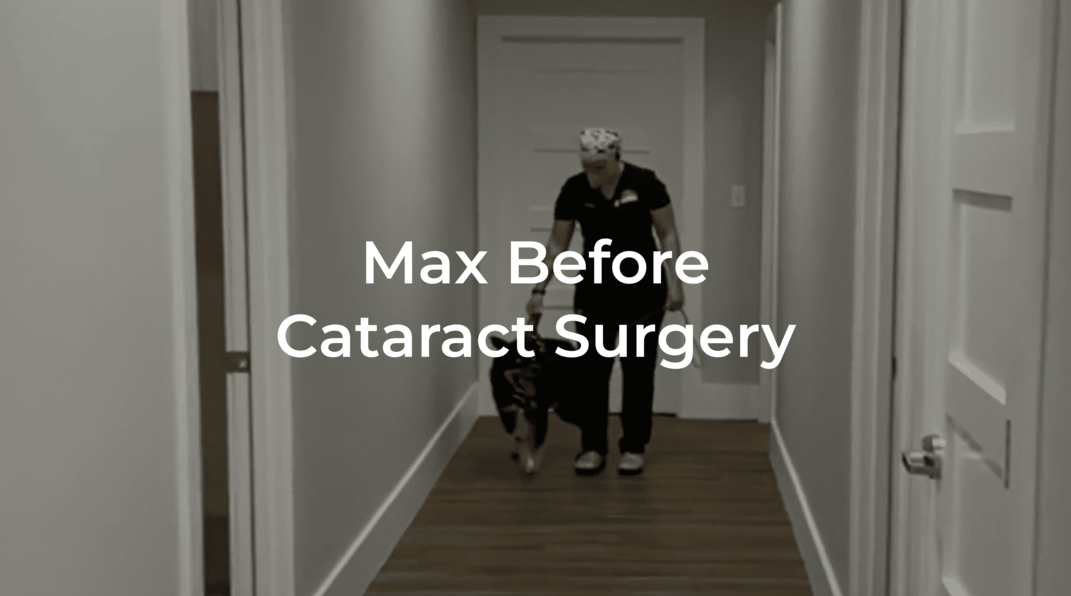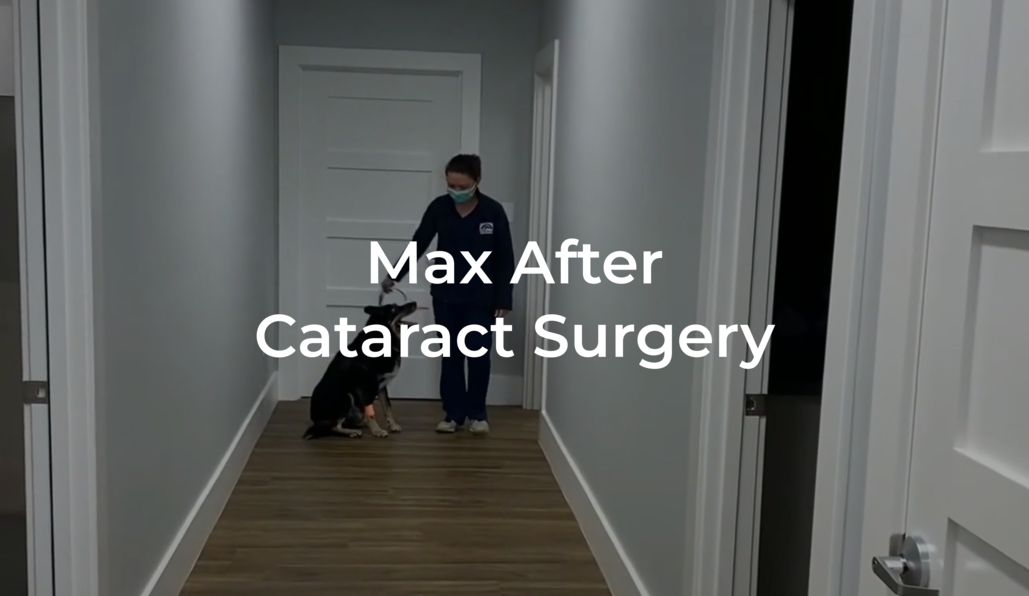Cataract Surgery



Cataract Surgery FAQ
You will find some of our most frequently asked questions regarding cataract surgery on this page. The video below shows Max before and after surgery. While not all of our patients are so eager to get up and go, this is an example of how well many of our patients can see immediately following surgery.
If you feel your pet has cataracts, whether just starting or fully developed, give us a call to be scheduled for an exam!
Cataract Surgery Q&A
What is a cataract?
A cataract is any opacity of the lens. The opacity, or cataract, may be very small and have a minimal effect on vision or the opacity may involve most of the lens, resulting in significant vision deficits or even complete blindness.
What is nuclear sclerosis?
As dogs age, the lens becomes harder (this is called nuclear sclerosis or lenticular sclerosis). This process begins around 8 years of age in dogs and results in a grayish cloudiness of the eye that progresses as the pet ages. Nuclear sclerosis does not typically interfere with vision and is not a cataract.
How can I tell if my dog has a cataract or nuclear sclerosis?
The answer is that you can't. If you are concerned, have your general veterinarian evaluate your dog's eyes, but often it is difficult for a veterinarian that is not an ophthalmologist to differentiate between these two conditions. Using specialized equipment and their expertise, a veterinary ophthalmologist can differentiate between a cataract and nuclear sclerosis. Many dogs have a combination of nuclear sclerosis along with a cataract, which makes diagnosis particularly challenging.
If my dog can see well, does that mean he/she does not have a cataract?
No…dogs can often see fairly well if the cataracts are small. Also, dogs adapt well if one eye is visual and the other eye is blind from a cataract. These dogs usually perform so well that the owner doesn't realize their dog is blind in one eye. Dogs are so good at adapting and memorizing their surroundings that it can be very difficult for an owner to know that their dog has vision problems until both eyes are severely affected.
Why do cataracts develop in dogs?
There are many potential causes of cataracts, including inherited predisposition, systemic disease (such as diabetes), and age-related changes. Cataracts can also develop secondary to other eye diseases, such as retinal disease, chronic uveitis (intraocular inflammation), and glaucoma (high pressure inside the eye).
Did you know that 75% of diabetic dogs develop complete cataracts within the first 9 months of diagnosis? These cataracts usually develop quickly—sometimes even overnight! This rapid cataract progression results in blindness and often causes associated intraocular inflammation.
Because of this tendency to develop secondary intraocular inflammation, cataract surgery for diabetic patients is considered more urgent than with some of the other types of cataracts.
Can anything be done for my dog's cataracts?
Once a cataract has developed, there is no known treatment to reverse the cataract or to make the lens clear again. The cloudiness of the lens is permanent unless cataract surgery is performed to remove the cloudy lens. Cataract surgery in dogs is typically performed when there is significant vision loss. Many dogs with cataracts do not need surgery because the opacities are small and do not significantly affect vision. Only a veterinary ophthalmologist can determine if cataract surgery is indicated in a particular patient and if that patient is a good candidate for surgery.
What is involved with cataract surgery in dogs?
Cataract surgery in dogs is very rewarding. For a blind dog to again be able to see its owner, to play with toys and to look out the window and see things is life-changing for pets and their owners. Cataract surgery is the process of removing the entire lens and replacing it with an artificial lens that is made specifically for dogs. Cataract surgery is an extremely delicate surgery and is performed under general anesthesia in dogs. If both eyes are affected, usually surgery is performed on both eyes simultaneously. The surgical procedure and equipment used to remove cataracts in dogs are the same as used for human cataract surgery.
How well will my dog see after cataract surgery?
After successful cataract surgery, dogs have vision that is very close to normal. Once surgery is performed and the lens is removed, a cataract cannot recur.
What if cataract surgery is not done?
Progressed cataracts can cause serious inflammation inside the eye. It is important that this intraocular inflammation be medically controlled whether or not cataract surgery is performed. Inflammation inside the eye that is not controlled can lead to other complications, such as glaucoma (elevated intraocular pressure), which is very painful, lens luxation and retinal detachment. If cataract surgery is not performed, your pet should be kept on an anti-inflammatory eye drop medication lifelong. Our goal is to restore vision, however, if surgery is not an option for some reason, we want to do our best to decrease the risk of complications from the cataracts that could make your pet uncomfortable.If your dog has cataracts but you are not planning to pursue surgery, it is still very important for you to have your dog evaluated by a veterinary ophthalmologist for treatment to help prevent complications from the cataracts.
If I decide to have cataract surgery performed on my dog, what all is involved?
The first step is to schedule an exam with Dr. Beaumont. She will perform a complete ophthalmic exam and determine if your pet is a favorable candidate for cataract surgery. If your pet is a good candidate, a couple of more diagnostic tests are required prior to surgery. Your pet will be lightly sedated and these tests cause no discomfort.
An ERG (electroretinogram) is performed to test retinal function; if the retinas are not functioning normally, removing the cataracts may not improve vision. An ultrasound of the eye is then performed to make sure there is no retinal detachment prior to surgery. If these test results are normal, blood is drawn for a complete blood count and serum chemistry to make sure your pet has no health issues that would increase the risk of anesthetic complications. If there are no concerns with the lab results, your pet will then be scheduled for cataract surgery. We will have you drop your pet off early on the morning of surgery and he/she will be discharged on the same day in the afternoon. Most pets have significantly improved vision by the time they are discharged on the day of surgery. Vision will continue to improve over the following 2-3 weeks as the intraocular inflammation resolves.
What is involved with caring for my dog after cataract surgery?
Dogs should be kept as calm and quiet as possible for the first two weeks following surgery. Your pet will be allowed to slowly resume normal activity over the 4-6 weeks following surgery. Your pet will be discharged on the day of surgery wearing an E-collar. This E-collar must be worn at all times for a minimum of a week following surgery (some dogs are required to wear the e-collar for a bit longer). Your pet will require oral medications for the first week post-operatively and will require several different types of eye drop medications that will gradually be reduced as the eye(s) heals and as the intraocular inflammation improves. Follow-up examination with Dr. Beaumont is very important to ensure the most successful post-operative results possible.
Post-operative examinations are required the day following surgery, 5-7 days later, 10-14 days later, 3-4 weeks later, 6-8 weeks later, 3-4 months later, 4-6 months later, followed by every 6-12 months thereafter. More frequent post-operative exams may be required if there are any post-operative complications. Lifelong follow-up at least yearly is recommended to continue to monitor your pet for complications that could reduce the long term successful outcome of surgery. We want your pet to remain visual and comfortable for life.
Are there any risks associated with cataract surgery?
The success rate of cataract surgery in most dogs is high (85-95%). Unfortunately, no surgery can be guaranteed to be successful. About 5-10% of dogs will not regain good vision due to complications, such as glaucoma, chronic intraocular inflammation and retinal detachment. Timely evaluation of cataracts in dogs and surgery sooner rather than later improves the rate of success. If your pet has had significant intraocular inflammation, there is a lower success rate and a higher risk of complications. Dr. Beaumont will discuss with you at your pet's initial exam whether or not your dog is a favorable candidate for surgery and if there are any significant findings that would increase the risk of complications.
There are always risks associated with general anesthesia. We monitor our patients very closely and rarely have anesthetic complications; however, there is always a risk, even in a young healthy pet.
How can I reduce the risk of post-operative complications in my dog following cataract surgery?
- Have your dog's eyes evaluated by a veterinary ophthalmologist as soon as cataracts are suspected (especially if your dog is diabetic) - DO NOT wait until the lens is completely opaque and the eye is blind.
- Follow all treatment directions correctly and faithfully.
- Bring your dog to all recommended post-operative recheck visits with your ophthalmologist. Routine post-operative recheck visits with your ophthalmologists are needed for the rest of your dog's life to improve the long term success rate of surgery.
- Call your ophthalmologist if you suspect any changes in your dog's eye such as squinting, increased discharge, persistent redness, cloudiness, rubbing or decreased vision.
Successful cataract surgery depends on a great team effort over the lifespan of your pet!
- A willing patient - your dog must allow itself to be treated with both oral and topical medications, and must allow its eyes to be examined by an ophthalmologist.
- A dedicated owner - who can follow treatment instructions and bring the patient for all scheduled ophthalmic examinations and call our office with any concerns.
- A dedicated ophthalmologist and staff - who are available when you need them.
- A dedicated family veterinarian - who is able to refer your dog to an ophthalmologist and work with you and the ophthalmologist to ensure that your dog is as healthy as possible.
Feel free to contact us with any questions you may have!



















